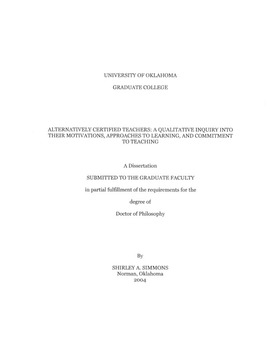| dc.contributor.advisor | Karpiak, Irene, | en_US |
| dc.contributor.author | Simmons, Shirley A. | en_US |
| dc.date.accessioned | 2013-08-16T12:19:20Z | |
| dc.date.available | 2013-08-16T12:19:20Z | |
| dc.date.issued | 2004 | en_US |
| dc.identifier.uri | https://hdl.handle.net/11244/698 | |
| dc.description.abstract | Alternative teacher certification has evolved over the last twenty years as a response to real and perceived shortages of qualified teachers. The reduction of teacher certification requirements has been viewed by many as a solution to teacher shortage problems as well as a way to improve the quality of the teaching force by recruiting highly-skilled people from the private sector who have developed real-world experience with subject matter. Rather than arguing the merit of alternative certification, this study pursued an understanding of successful alternatively certified teachers in order to inform policy and practice. | en_US |
| dc.description.abstract | In this study, 18 alternatively certified teachers, identified by their principals as successful, were interviewed using a qualitative approach. Although this study reflects only a small sample of alternatively certified teachers in the state of Oklahoma, this study has addressed the questions of what were the common motivations of alternatively certified teachers, what were their approaches to learning how to teach, how were their professional identities developed, what kept them committed to the teaching profession, and to what do they attribute their perseverance and success. The study demonstrated that these alternatively certified teachers were searching for a career in which they could make a difference. They approached learning in a variety of ways but learned mostly from their interactions with colleagues through mentoring and professional development and through their classroom experience. Their professional identity developed over time but was related to their sense of efficacy in the classroom and affirmation from their peers. Many of the factors that kept them committed to teaching were the same factors that drew them to teaching in the first place---a sense of fulfillment and commitment to students. The major factor contributing to their success and perseverance was school climate, specifically collegiality and administrator support. This study also explored and challenged policy makers' and educators' prevailing assumptions regarding alternative certification. | en_US |
| dc.format.extent | ix, 161 leaves ; | en_US |
| dc.subject | Education, Teacher Training. | en_US |
| dc.subject | Teachers Selection and appointment Oklahoma. | en_US |
| dc.subject | Teachers Certification Oklahoma. | en_US |
| dc.subject | Teachers Oklahoma. | en_US |
| dc.title | Alternatively certified teachers: A qualitative inquiry into their motivations, approaches to learning, and commitment to teaching. | en_US |
| dc.type | Thesis | en_US |
| dc.thesis.degree | Ph.D. | en_US |
| dc.thesis.degreeDiscipline | Department of Educational Leadership and Policy Studies | en_US |
| dc.note | Adviser: Irene Karpiak. | en_US |
| dc.note | Source: Dissertation Abstracts International, Volume: 65-01, Section: A, page: 0120. | en_US |
| ou.identifier | (UMI)AAI3120037 | en_US |
| ou.group | Jeannine Rainbolt College of Education::Department of Educational Leadership and Policy Studies | |
